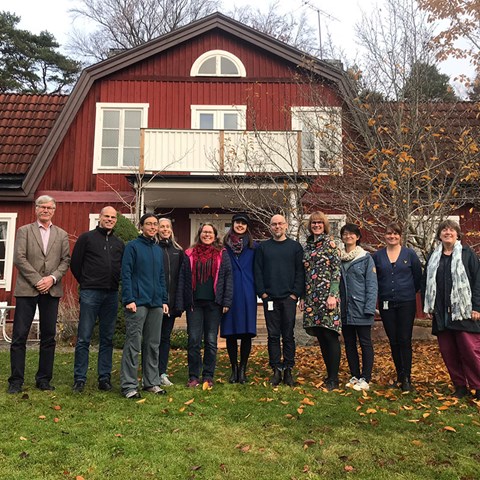Contact
SLU Future Food
www.slu.se/futurefood
futurefood@slu.se

In November, SLU's new Interdisciplinary Academy (IDA) makes its official start. Two projects and eleven researchers are admitted to the academy. Together, they represent nine departments, all four SLU faculties and a wide range of different science branches.
The call for the Interdisciplinary Academy (IDA), announced in May 2022, welcomed groups of 5-10 researchers employed at SLU to submit proposals for themes consisting of questions about a scientific problem area of a complex nature that need a cross-disciplinary approach to be managed and perhaps solved. Out of five applications, two were seleced.
Janne Bengtsson, professor emeritus at the Department of Ecology, was a member of the assessment group reviewing the applications. He was impressed by the quality of the applications:
– We received five applications, which was good considering the short application period this first year. This shows that despite a short preparation period, our university can produce really good interdisciplinary applications. They all tackle difficult sustainability issues in impressive ways.
– This will also be an opportunity to connect the different campuses, where the researchers represent different skills and perspectives. Thus, the organisational challenge that lies in being divided geographically, can be turned into an additional value.
Karin Holmgren, former vice chancellor at SLU and now professor at the Department of Urban and Rural Development, was also part of the selection group. She also emphasises that all five applications to IDA were strong:
– We were pleased to see new and interesting interdisciplinary collaborations, spanning several science branches and also campus boundaries. In the KoN evaluation (Evaluation of Quality and Impact at SLU) in 2018, more collaboration across subject boundaries was called for – I think IDA really contributes to that.
– The applicants highlight the need for interdisciplinary holistic research perspectives to find solutions for long-term sustainable use of our green natural resources, Karin Holmgren continues. The applications proofed good insights into the need for in-depth discussion, open dialogue and communication to attack problems, understand goal conflicts and initiate possible solutions. My belief is that this will lead to new high quality collaborations and applications from SLU.
The IDA participants will for the coming 8 months devote 20% of their working time to explore and develop their theme together with their co-applicants. Ullbo house on Campus Ultuna, a red wooden villa embedded in greenery next to the Knowledge Park, will serve as the meeting place and creative environment for the participants.
The Interdisciplinary Academy is coordinated by SLU Future Food, with the support of the NJ faculty, but is aimed at all researchers at SLU. Janne Bengtsson praises the initiative:
– The fact that we strengthen our competence around sustainability and interdisciplinary will also make SLU a stronger player in comparison to other universities, and this can help us build our collaborations with other universities as well. This is cutting-edge interdisciplinary research!
The two applications admitted to IDA 2022-2023 are:
Futures for Agriculture - An interdisciplinary exploration of the science and values underpinning academic discourses on human-nature interactions:
Multifunctional landscape transformations – turning around the trade-offs
The climate destabilisation and biodiversity crisis open imminent and fundamental questions about human-nature relations. The close entanglement of human and nature in agriculture makes this a particularly suitable arena for studying human-nature relations. Agriculture is at the same time essential for human survival, and a major cause of and vulnerable to biodiversity loss, climate change and antimicrobial resistance.
We are five researchers in natural, social and human sciences who examine positions in academia on the future of agriculture. We explore the scientific evidence and wider social and cultural contexts that shape the rationale and premises underpinning dominant and contrasting academic discourses on the futures of agriculture, such as “agroecology”, “closing the yield gap” and “climate smart agriculture”. In doing so, we identify the respective ontologies, epistemologies and value judgements across sciences.
Our aim is an understanding and appreciation of the contributions of social, human and natural scientific disciplines with evidence and perspectives in the much needed interdisciplinary dialogue on agriculture and its future.
Multifunctionality implies the supply of multiple and diverse ecosystem functions, services and goods. We will explore ways to manage land so that its multiple functions can be promoted to resolve pressing and interlinked sustainability challenges, such as climate change, biodiversity loss and sustainable production.
Current landscape management heavily relies on evaluations of trade-offs that are often carried out with limited considerations to multiple functions. We will identify a wide range of trade-offs across key types of landscapes, and work to ‘turn around‘ the trade-offs. By ‘turn around’ we mean to take advantage of our wide range of competencies to look at them from innovative angles, and identify the underlying reasons for them and possible solutions. There is no obvious answer to managing landscapes in a way that balances different values such as production, biodiversity, climate mitigation, climate adaptation and recreation.
Such a daunting task across many landscapes would require many transformations, that is, several complementary solutions. This theme will explore such transformations, with perspectives from a wide variety of disciplines including landscape governance and management, strategic environmental planning, business economics, cultural geography, environmental communication, biology and agriculture.
Call for applications 2022: The Interdisciplinary Academy – a new opportunity for SLU researchers
News item May 2022: Ny tvärvetenskaplig satsning https://www.slu.se/ew-nyheter/2022/5/interdisciplinary-academy-ida/
SLU Future Food
www.slu.se/futurefood
futurefood@slu.se